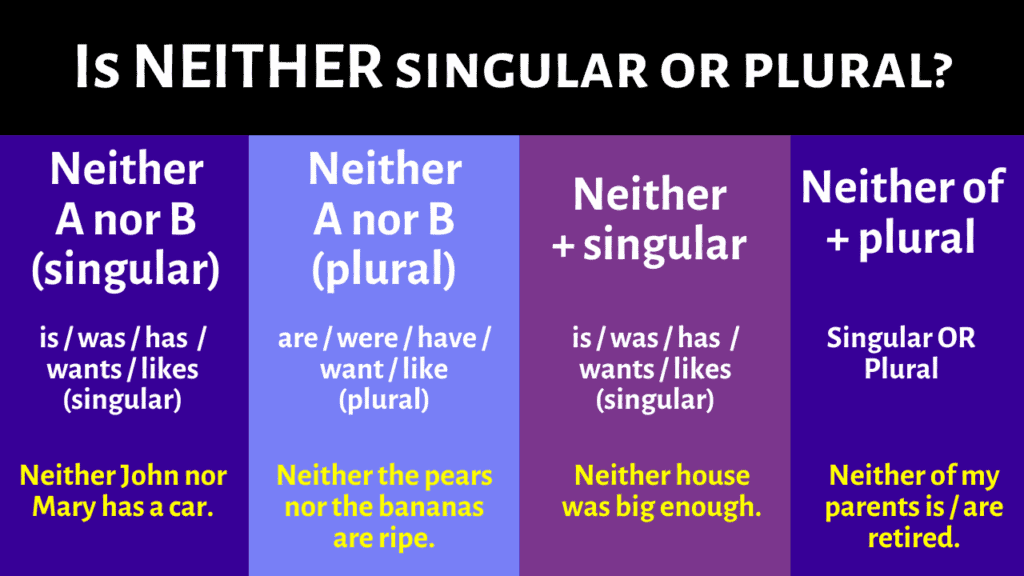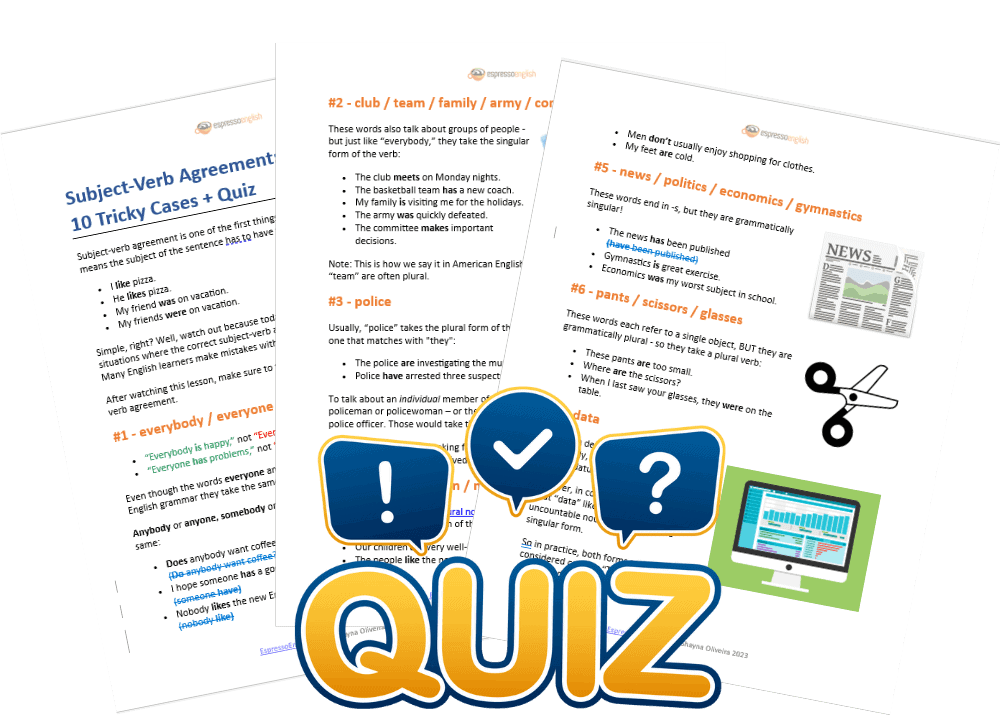
Subject-verb agreement is one of the first things you learn in English class. It means the subject of the sentence has to have the correct verb form:
- I like pizza.
- He likes pizza.
- My friend was on vacation.
- My friends were on vacation.
Simple, right? Well, watch out because today we’ll look at 10 tricky cases, some situations where the correct subject-verb agreement might not be so obvious! Many English learners make mistakes with these, so pay close attention.
After taking this lesson, make sure to try the quiz to test yourself on subject-verb agreement.
#1 – Everybody / Everyone
- “Everybody is happy,” not “Everybody are happy.”
- “Everyone has problems,” not “Everyone have problems.”
Even though the words everyone and everybody refer to multiple people, in English grammar they take the same verb form as he, she, or it.
Anybody or anyone, somebody or someone, and nobody or no one are the same:
- Does anybody want coffee?
(Do anybody want coffee?) - I hope someone has a good idea.
(someone have) - Nobody likes the new English teacher.
(nobody like)
#2 – Club / Team / Family / Army / Committee
These words also talk about groups of people – but just like “everybody,” they take the singular form of the verb:
- The club meets on Monday nights.
- The basketball team has a new coach.
- My family is visiting me for the holidays.
- The army was quickly defeated.
- The committee makes important decisions.
Note: This is how we say it in American English. But in British English “family” and “team” are often plural.

#3 – Police
Usually, “police” takes the plural form of the verb, the same one that matches with “they”:
- The police are investigating the murder.
- Police have arrested three suspects.
To talk about an individual member of the police, we can say policeman or policewoman – or the gender-neutral term police officer. Those would take the singular form:
- The policeman is looking for evidence.
- A police officer has arrived at the scene of the accident.

#4 – People / Children / Men / Women / Mice / Feet
These words are irregular plural nouns (nouns that are not formed by adding -s) and they take the plural form of the verb:
- Our children are very well-behaved.
- The people like the new president.
- Men don’t usually enjoy shopping for clothes.
- My feet are cold.
#5 – news / politics / economics / gymnastics
These words end in -s, but they are grammatically singular!
- The news has been published
(have been published) - Gymnastics is great exercise.
- Economics was my worst subject in school.

#6 – pants / scissors / glasses
These words each refer to a single object, BUT they are grammatically plural – so they take a plural verb:
- These pants are too small.
- Where are the scissors?
- When I last saw your glasses, they were on the table.

#7 – data
There is a debate about the word “data”! Technically, data is plural (the singular form is “datum”). However, in common usage, people often treat “data” like “information” – as an uncountable noun, which takes the singular form.
So in practice, both forms are essentially considered correct: “The data is accurate” and “The data are accurate.”

#8 – there
Whether we use a singular verb or plural verb depends on what comes immediately after it:
- There is a table and two chairs in the room.
- There are two chairs and a table in the room.
- There was an apple, a banana, and an orange in the bowl.
- There were several pieces of fruit in the bowl.
- There has been an increase in crime lately.
- There have been many car accidents on this street.

#9 – Neither
“Neither” refers to two things, and it means “not one and not the other one” – so should we use a singular or plural verb after it? Well, we have a few different structures with “neither”:
- Neither A nor B
- Neither one
- Neither of + plural
Technically, neither goes with a singular verb, and this is how we use it with the first two sentence structures:
- Neither Mary nor Eva has a car.
- I read two books. Neither one was any good.
However, when we have the sentence structure “Neither of + plural,” or “Neither A nor B” when those items are plural, then many people use the plural verb:
- Neither of my parents have a college degree.
- Neither of those houses were big enough for our family.
- We have two computers. Neither of them are working right now.
- Neither the pears nor the bananas are ripe.
- Neither the parents nor the children were informed about the schedule change.

#10 – Half Of / A Third Of / 40% Of / Some / Most / None
Whether we use a singular or plural verb form depends on what follows them! The verb always matches the singular or plural noun immediately before it. Check out these examples:
- Half of the students are from another country.
- Half of the class is from another country.
- Some of these facts are incorrect.
- Some of this information is incorrect.
- 40% of the people don’t support the new law.
- 40% of the country doesn’t support the new law.
- None of my things were damaged in the fire.
- None of my furniture was damaged in the fire.
Now you know how subject-verb agreement works in some of these more advanced cases! Next, go ahead and download the lesson PDF and try the quiz to test yourself on subject-verb agreement in these tricky situations.
If you want to take your English grammar to the next level and really master the advanced details of the language, come join my Advanced English Grammar Course – it will help you understand grammar easily and use it correctly and confidently in your own English.











